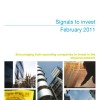There has recently been an increased level of debate as to how the structure of the railways operates and the manner in which franchises are provided. Whilst this paper does not look at the franchise mechanism itself it does pose the question as to how we could further incentivise train operating companies (TOCs) to invest in the system on which they operate.
Most franchises in Great Britain are awarded by the Department for Transport (DfT), following an invitation to tender. Companies that tender do so according to a number of service criteria and targets that are outlined by the DfT to be achieved during day-to-day operation.
However, as with most regulated industries the franchise model is not without its flaws. Some companies perform well, others do not. There have been instances of fare increases significantly above the rate of inflation, with questionable service provision and improvements taking place. There is also anecdotal evidence that the confusing terms and conditions and negotiations within the franchise system making performance achievement hard to measure and value hard to judge.
Part of the reason for such occurrences is a reduced willingness to improve an infrastructure asset which the TOC does not own.
As we have seen from the government‟s recent announcements in the Comprehensive Spending Review, the level of subsidy provided to the companies that operate these franchises is due to fall, and fares rise. This will not please rail users unless service levels continue to improve and investment continues to take place to upgrade Britain‟s ageing rail network.
The questions once again arise: are franchise companies willing to invest in the network, are they able to invest in the network, and are they willing to make these investments given the current length of the franchise agreements and that they do not receive the full market return for the investment that takes place?
There is a willingness among TOCs to invest in physical assets. Virgin, for example, has bid for the design, build and operate contract for the new Tampa to Orlando high speed line in Florida. Train operators in the UK have invested in station refurbishment, while alternative models (such as “adopt-a-station”
schemes) have been applied to harness alternative resources and community efforts.
Other solutions have been proposed which include lengthening franchises to encourage franchise operators to take a long term view of investment, or privatising the system allowing all decisions to be made on a cost/profit basis with ownership of the asset under private hands. However, privatisation holds the potential for the formation of an uncompetitive monopoly and brings into question how the asset is treated in terms of its national efficiency, importance and strategic value.
Ways in which such investment issues could be alleviated include creating regulatory frameworks which incentivise investment (effectively subsidising the TOC) and extending the term of franchises to extend the period under which a return is made.
As well as the financial issues explored in this paper, there may be other obstacles to bringing private investment into the physical rail network. These include issues of planning law, compulsory purchase mechanisms and regulatory and procurement processes, all of which would impact private sector efforts to build new railway infrastructure. This paper only considers the financial mechanisms by which investments could be encouraged.
Company website:
http://www.acenet.co.uk/


